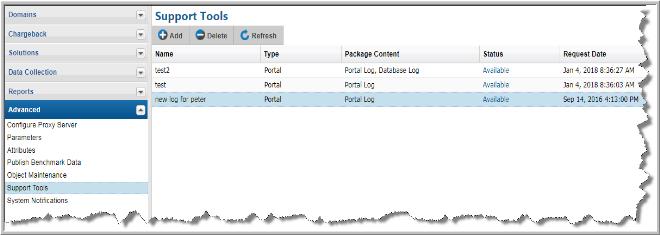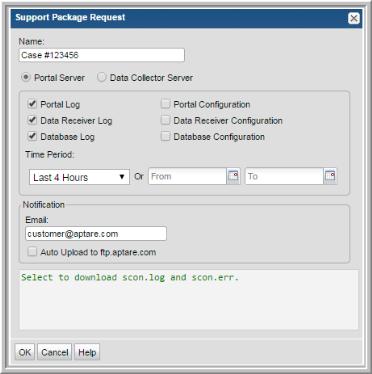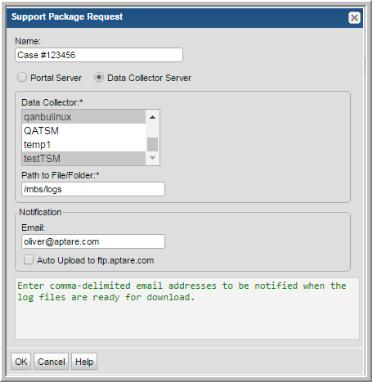Use the view pane to track the status of your download and access the files as they become available. The grid is sorted by Request Date.


Add | Click to create a support package request. You can create a portal server configuration files package or a data collector log package. See Requesting a Support Package. |
Delete | Click Delete to remove or cancel a package creation. |
Refresh | Click Refresh to update the status on the view pane. The pane does not refresh automatically. |
Name | Displays the name assigned to the package. |
Collector | The collector associated from which the log files were retrieved. |
Type | Displays the package type: Portal or Data Collector (with collector name). |
Package Content | Displays the content of the support package. |
Status | The Support Package requests are listed with links to access the downloadable files. The Status of a request can be: • Queued • Processing • Available - Click the Available link to download the zip file. • Failed - Mouse-over a Failed status to view the details of the failure. |
Request Date | Displays the creation date and time of the support request package. By default, the grid is sorted by descending request date. |
Email Address | Displays the notification email address. You can choose to receive an email alert when the package creation is complete. This field identifies the alert recipient. |
Auto Upload | Displays a Yes or No to indicate if the package is to be automatically uploaded to the ftp.aptare.com site. |

Portal Log | Select to download the Portal.log, upgrade.log, audit.log and relevant tomcat logs. This provides detailed logging for the portal servlet. Logs portal login requests, user impersonations, portal reports that are run - basically everything the user does in the Portal web browser window. Database problems show up as SQL exceptions and often list the associated Oracle error number (ORA nnn). |
Portal Configuration | Select to download the Portal.properties, web.xml, server.xml, startup_agent.sh, startup_portal.sh, httpd.conf and httpd-ssl.conf. |
Data Receiver Log | Select to download the datarcvr.log and relevant tomcat logs. |
Data Receiver Configuration | Select to download all files under /opt/aptare/datarcvrconf. |
Database Log | Select to download scon.log, scon.err and aptare-trans.log. The scon.log provides detailed logging from database stored procedures. Shows input and output values, and timing of queries. Oracle errors are prefixed with ORA-nnnn, where nnnn is the APTARE or Oracle error number. On Windows, if the directory C:\tmp exists, the file will be written there. Otherwise, it will be written to C:\opt\oracle\logs. The scon.err provides error messages from the database stored procedures. Oracle errors are prefixed with ORA-nnnn, where nnnn is the APTARE or Oracle error number. On Windows, if the directory C:\tmp exists, the file will be written there. Otherwise, it will be written to C:\opt\oracle\logs. The aptare-trans.log provides the transactions that have run and the time taken to run them. This is useful to troubleshoot performance issues and reports that take a very long time to run. |
Database Configuration | Select to download the initscdb.ora file. |
Time Period | Choose a date range such as last 4 hours, last 24 hours, last week or specify a time period. |
Email | Enter comma-delimited email addresses to be notified when the log files are available for download. |
Auto Upload to ftp.aptare.com | Check this box to send these files directly to Support for analysis. This will use ftp.aptare.com. |

Data Collector* | Select the Data Collector(s) from which the log files will be retrieved. You can multi-select the data collectors. This enables you to create multiple support packages at once. Each collector will be listed as an individual support package. The associated collector is displayed as a column in the same row as the support package so you can easily identify the origin of the log. |
Path to File/Folder* | Enter one or more paths separated by commas. You may use /* to select multiple files in the directory, or /** to also include files in subdirectories. The paths will always be relative to the <APTARE_HOME> folder - do not include the explicit <APTARE_HOME> portion in the path. For informational and troubleshooting purposes only, know that <APTARE_HOME> is typically configured to be: /opt/aptare on Linux and C:\Program Files\Aptare on Windows. Moving up the directory hierarchy using .. is not supported. In addition to log files, other files useful for troubleshooting can be downloaded; for example, collectorconfig.xml or updateconfig.sh. The most common location from which to download files is: /mbs/logs/** For additional wildcards see File Selector Wildcards. |
Email | Enter comma-delimited email addresses to be notified when the log files are available for download. |
Auto Upload to ftp.aptare.com | Check this box to send these files directly to Support for analysis. This will use ftp.aptare.com. |
Value | Description |
<file path> | The exact file will be retrieved for example, mbs/conf/collectorconfig.xml |
<directory path> or <directory path>/ | All contents of the directory will be retrieved for example mbs/logs/ |
* | Matches any part of the filename within the same directory. For example mbs/logs/*.log will get all .log files that are in the mbs/logs directory (but not in any sub-directories). |
** | Matches any part of the path, including crossing directory boundaries. For example mbs/rawdata/**192.168.0.1** will retrieve any file in the mbs/rawdata directory or subdirectories that contains 192.168.0.1 in the filename. |
/**/ (or **/ at the start of the path) | Matches zero or more directories. For example mbs/rawdata/**/192.168.0.1/** will retrieve any file under the mbs/rawdata directory that is also under a sub-directory named 192.168.0.1. Note: /**/ (or **/ at the start of the path) may only be present once. |
? | Matches any single character. For example mbs/rawdata/192.168.0.? would match either of mbs/rawdata/192.168.0.1 or mbs/rawdata/192.168.0.2. |
{a,b} | Specifies alternative values, exactly one of which must be matched. For example mbs/logs/{metadata,eventcollector}.log will retrieve either of mbs/logs/metadata.log or mbs/logs/eventcollector.log. |
[characters] | Matches any single character that is specified within the square brackets. Either individual characters or a range may be specified. For example 192.168.0.[125-7] would match any of 192.168.0.1, 192.168.0.2, 192.168.0.5, 192.168.0.6, 192.168.0.7. Note: This wildcard cannot be used if the path is enclosed in square brackets. |
[!characters] | Matches any single character that is not specified within the square brackets. Either individual characters or a range may be specified. For example 192.168.0.[!125-7] would match any of 192.168.0.3, 192.168.0.4, 192.168.0.8, but would not match 192.168.0.1. Note: This wildcard cannot be used if the path is enclosed in square brackets. |